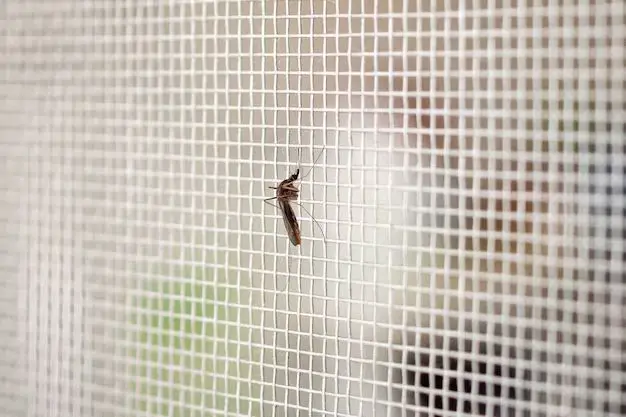Mosquitoes can be a nuisance and even a health hazard. They bite to feed on blood, and in the process, can transmit diseases like malaria, dengue fever, yellow fever, Zika virus, and others. Screening windows, doors, and other openings with mesh is an effective way to keep mosquitoes out of homes and prevent bites and disease transmission. But what size mesh is small enough to successfully block mosquitoes?
Page Contents
How Small are Mosquitoes?
Mosquitoes are very tiny insects. Different species vary somewhat in size, but they are all quite small. The average size of the most common mosquito species is 3-10 mm (0.12-0.39 inches) in length. Their slender bodies allow them to pass through surprisingly small spaces and openings.
Some key measurements on mosquito size:
- Body length: 3-10 mm (0.12-0.39 in)
- Wingspan: 5-12 mm (0.2-0.47 in)
- Proboscis (feeding tube) length: 2-6 mm (up to 0.24 in)
So mosquitoes require very tiny openings to pass through. Screening openings need to be small enough that mosquitoes cannot squeeze their bodies through. Their wings, legs, and proboscis also need to be blocked.
Recommended Mesh Size
Most public health and pest control experts recommend using screen mesh of 18 x 14 or 16 x 16 threads per square inch to effectively keep out mosquitoes. Some of the key reasons include:
- 18 x 14 mesh has openings of about 1.0 mm
- 16 x 16 mesh has openings of about 1.2 mm
- These opening sizes are smaller than the body size of most mosquitoes, preventing them from passing through.
- Mesh with larger openings may allow the smallest mosquito species and young mosquitoes to penetrate.
- Mesh with much smaller openings tends to obstruct airflow and views.
The National Screen Association recommends using fiberglass, vinyl-coated polyester, or aluminum mesh with 18 x 16 or 18 x 14 openings for mosquito control.
18 x 14 Mesh

18 x 14 mesh has 1,296 openings per square inch, with each opening about 1.0 mm across. This size is ideal for keeping out mosquitoes while still allowing airflow.
16 x 16 Mesh

16 x 16 mesh has 1,024 openings per square inch, with openings of around 1.2 mm. This can also effectively block mosquitoes in most cases. The slightly larger holes allow for increased airflow.
Other Factors in Mesh Screening
In addition to mesh size, a few other factors impact the effectiveness of screening for mosquito control:
- Material – Fiberglass or metal screens are recommended over plant-based materials like cotton, which may shrink or sag over time.
- Holes and Gaps – Any holes or gaps in the screening create opportunities for mosquitoes to get through. Screens should be properly installed and maintained.
- Doors and Entryways – Doors and entryways should be fitted with tight-sealing screens. Self-closing screen doors are ideal.
- Attic Vents – Attic and roof vents should be covered with corrosion-resistant mesh to block entry points.
Properly installed screening with a tight mesh of 18 x 14 or 16 x 16 is the best protection. Screen doors in particular should seal tightly with a minimal gap between screen and frame.
Screening Options by Location
Where mosquito screening is installed makes a difference in the ideal mesh size and material to use:
Windows
- Fiberglass, aluminum, or vinyl-coated fiberglass window screens work well.
- Go with 18 x 14 or 18 x 16 mesh.
- Fit screens tightly into window frames.
Doors
- Self-closing aluminum or vinyl screen doors are best.
- Use 18 x 16 mesh.
- Look for tight seal between screen and door frame.
- Make sure screen doors open outward and fully close.
Porches
- Aluminum, vinyl-coated, or phosphor bronze screening is recommended.
- 18 x 14 mesh provides excellent mosquito protection.
- Corrosion-resistant mesh is important for longevity.
Attic Vents
- Use aluminum or copper mesh.
- Look for 18 x 16 or 20 x 20 mesh for ventilation.
- Make sure screens are securely installed over all vents.
MESH TYPE COMPARISON TABLE
| Mesh Type | Pros | Cons |
|---|---|---|
| Aluminum |
|
|
| Vinyl-coated fiberglass |
|
|
| Bronze/Copper |
|
|
| Fiberglass |
|
|
Conclusion
To effectively block mosquitoes, screens should be made of durable, corrosion-resistant mesh material with openings no larger than 1.2 mm. Fiberglass, aluminum, and vinyl-coated fiberglass are common options. Mesh with 18 x 14 or 16 x 16 openings per square inch is recommended by most experts for ideal mosquito protection and airflow. Tight-fitting screens on windows, doors, porches, and attic vents will help prevent mosquito entry and bites. With properly installed small mesh screens, you can enjoy the fresh air while keeping pesky mosquitoes at bay.
